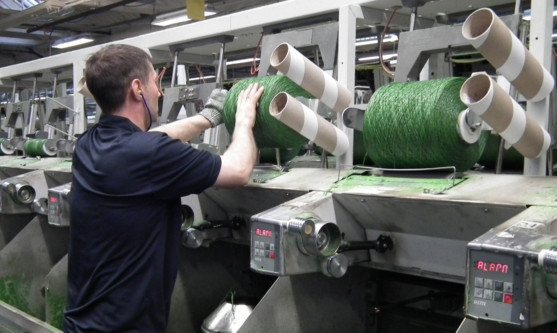Performance textiles group Low & Bonar said another of its Dundee production lines could be transferred to Abu Dhabi this year.
Chief executive Brett Simpson said the timing of the move would depend on the state of the market.
“This was something we originally said could move in 2015 but we didn’t go ahead with it that year,” he said. “It may happen this year, and it may not.
“We haven’t moved it yet and we will be watching how the market progresses throughout the year.
“This is something we are keeping under review.”
Founded more than a century ago and synonymous with the city’s jute trade, Low & Bonar made half of its 140-strong Dundee workforce redundant in 2014.
It decided to transfer part of its Bonar Yarns artificial grass production from the Caldrum Works to Abu Dhabi to improve profitability.
Mr Simpson said the Dundee operation where the remaining 70 staff are employed performed well last year.
Overall, group revenue was down 3.6% at £395.8 million but pre-tax profit was up 5.6% at £26.6m in the 12 months to November 2015. Operating margins were raised from 7.7% to 8.3%, benefiting from lower raw material costs during the first half of the year.
The sales mix in most Low & Bonar businesses improved, and there was strong demand in key segments.
The overall demand for products remained robust and reflected the diversity and strength of niche market positions, products and service delivery.
Sales on a constant currency basis increased by 2.4%.
Chairman Martin Flower said: “The group has continued to progress, delivering a good performance againsta challenging market backdrop.
“Whilst it is expected that market conditions in some of the group’s end markets will remain difficult, the board is confident that, with continued focus on efficiency gains and improved commercial execution, further progress will be made in the current year.”
A realignment in the operating structure into five global business units better positioned the group and created improved routes to market.
Capital expenditure increased 74% to £33.0m including £13.6m on the new factory build in Changzhou, China, and £5.6m on a new non-woven geotextile factory in Tiszaujvaros, Hungary.
The group was able to balance out the impact of weaker sales income in euros, its principal functional currency, with a higher proportion of US dollar sales so that the impact of foreign exchange rate changes on profits was broadly neutral.
